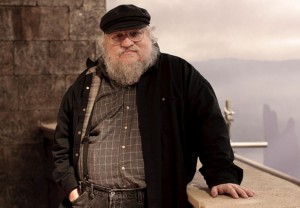Art reflects life – Syria and the Game of Thrones

Parallels can be drawn between the writing of George R.R. Martin’s ‘Game of Thrones’ and the refugee crisis
One is a television fantasy drama and the other one of the most interminable and complex challenges facing humanity.
But the TV hit ‘Game of Thrones’ and the Syrian refugee crisis intersected this month when novelist George R.R. Martin took to social media to weigh into the debate over Syrian refugees.
And his opinions will not surprise any fans of ‘Game of Thrones’.
Martin quoted Emma Lazarus’ poem ‘The New Colossus’, which is etched on the base of the Statue of Liberty, to argue that the US should offer shelter to even more refugees from the Syrian conflict.
Martin grew up in Bayonne, New Jersey, and has spoken about the experience of looking across at New York City and the Statue of Liberty – on which is inscribed Lazarus’ words:
‘Give me your tired, your poor,
‘Your huddled masses yearning to breathe free,
‘The wretched refuse of your teeming shore.
‘Send these, the homeless, tempest-tost to me,
‘I lift my lamp beside the golden door!’
“For me, Lady Liberty and the words on her base represent the best of what this nation of immigrants is all about,” Martin wrote.
“One has to wonder if all the governors (including our own governor here in New Mexico, I am ashamed to say) and congressmen voting to keep out the Syrian refugees have ever visited the Statue, or read the words on her base. If so, they surely failed to understand them,” he said.
Martin also criticised Donald Trump, who has been an outspoken opponent of taking in refugees, saying that he and the 31 mostly Republican governors who agree with him “have it wrong, wrong, wrong”.
“The Syrian refugees are as much victims of ISIS as the dead in France,” he said.
The debate about refugees in the US is largely a partisan one and Martin’s position is consistent with his broader political allegiances. He’s been a frequent donor to Democrat candidates over the years.
And his feelings on the issue may have also crept into his fiction.
In ‘Game of Thrones’ one of the major debates protagonist Jon Snow faces is whether to allow the besieged Wildlings into Westeros.
As Lord Commander of the Night’s Watch, he favors letting them through and allowing them to settle in The Gift, a sparsely populated region directly south of the Wall that’s owned by the Night’s Watch.
But many of his Night’s Watch brothers strongly disagree, arguing that the Wildlings are too dangerous and unpredictable to live in the Seven Kingdoms.
There is a border fence involved in the plotline so it has been likened to the debate around Mexican immigrants.
But there are also parallels with the global refugee crisis.
The Wildlings’ desire to move south isn’t motivated by economics. They are seeking to escape the White Walkers, just as Syrian refugees want to escape ISIS.
And the objections of some characters are, likewise, more about security concerns than about economics.
Jon Snow’s most persuasive argument in favor of granting amnesty to the Wildlings could also be helpful in the real world. He argues that letting the Wildlings go south of the Wall could actually make the people of Westeros safer by reducing the number of people available for the White Walkers to turn into Wights.
By the same token, the argument runs, letting more Syrian refugees immigrate to the US could prevent some of them from being tempted to aid ISIS.
The point that Martin, through his character Jon Snow, makes is that the refugees aren’t the enemy. The real enemy is the merciless and brutal force that the refugees are fleeing.
Laurie Nowell
AMES Australia Senior Journalist












